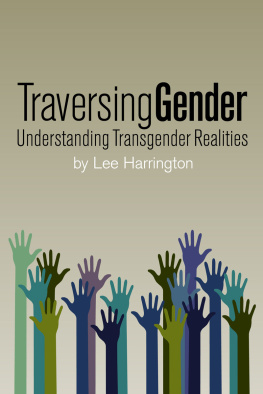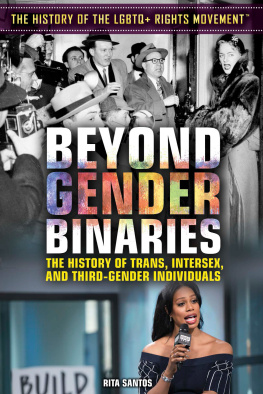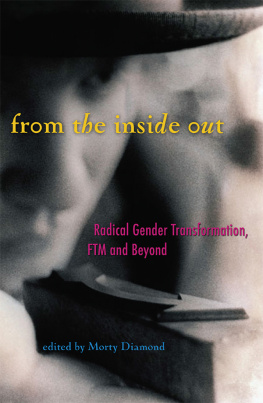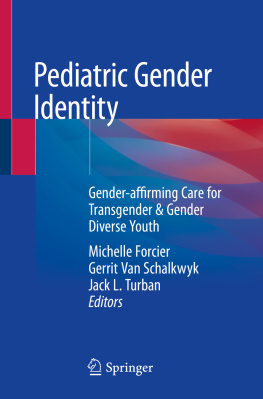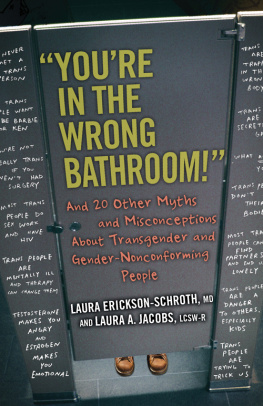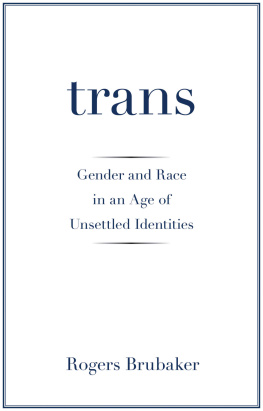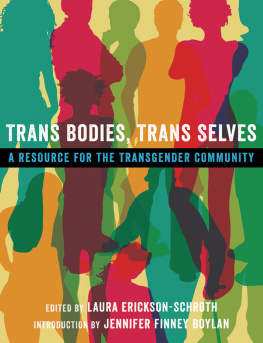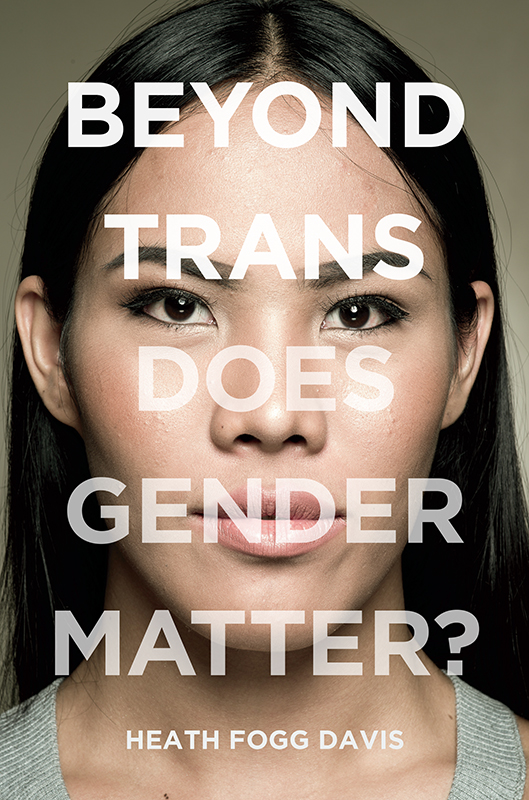
Beyond Trans
Beyond Trans
Does Gender Matter?
Heath Fogg Davis

NEW YORK UNIVERSITY PRESS
New York
NEW YORK UNIVERSITY PRESS
New York
www.nyupress.org
2017 by New York University
All rights reserved
References to Internet websites (URLs) were accurate at the time of writing. Neither the author nor New York University Press is responsible for URLs that may have expired or changed since the manuscript was prepared.
ISBN : 978-1-4798-5540-7
For Library of Congress Cataloging-in-Publication data, please contact the Library of Congress.
New York University Press books are printed on acid-free paper, and their binding materials are chosen for strength and durability. We strive to use environmentally responsible suppliers and materials to the greatest extent possible in publishing our books.
Manufactured in the United States of America
10 9 8 7 6 5 4 3 2 1
Also available as an ebook
For my kids
Contents
Sex Stickers
It was another day of using a city bus to get around Philadelphia. The Southeastern Pennsylvania Transportation Authority runs public transportation in this city of a million and a half. People here just call it SEPTA. And everyone has a SEPTA story to share, or maybe two or three. The buses, trains, and trolleys that crisscross the city are notoriously late and crowded. The company slogan, Were getting there, says it all. Its as if the ad writers knew they had to keep it real in this city of grit.
Charlene Arcila, an African American transgender woman who lived and died in this city, was no stranger to grit. For her it was another day of dealing with the snickers and sneers of the people she passed on sidewalks and interacted with in stores and restaurants. On top of all that, there were the sex stickers. She swiped her monthly public transit pass marked with an F to signify a female sex sticker, and braced for what might come. She hoped that she could quietly find a seat, and ride to where she needed to go. That today would be one of the good days in the city of brotherly love. It was not. Arcila tells her story in a weary voice.
The driver was like, You cannot use this pass. After I had swiped it, and as I was walking to my seat, he called me back to the front and I said, Well, why cant I? He said, Because you are not a female. And I was like, Well, I am a transsexual. And hes like, Whats that?! And Im like, okay, I do not feel like educating this man right now. I just want to get to my destination. So I pulled out two dollars, and I put the two dollars into the meter.
On a subsequent bus trip, Arcila tried to use an M for male transit pass. It, too, was rejected, this time on the bus drivers pronouncement that she was not a male.
From 1981 to July of 2013, SEPTA mandated that all of its monthly transit passes bear a male or female sticker that matched the sex identity of its purchaser and user. SEPTAs employee handbook instructed bus operators to verify each monthly pass for the correct date and the correct sex marker. But the handbook gave no guidance about the criteria that bus drivers should use to verify the sex of riders as they carried out their many other stressful duties. Consequently, individual bus operators were free to use their own subjective sex-identity judgments to determine which pass holders could access the buses under their control.
Having had both her female and male sex-marked passes rejected, Arcila, a longtime activist for transgender and gay rights in Philadelphia, filed a formal legal complaint with the city of Philadelphia. The complaint alleged that SEPTAs sex sticker policy violated her civil right to be free of gender identity discrimination. The city added gender identity to its lengthy list of legally protected identity categories in 2002. The ordinance defines gender identity as self-perception, or perception by others, as male or female, which includes an individuals appearance, behavior, or physical characteristics, that may be in accord with, or opposed to ones physical anatomy, chromosomal sex, or sex assigned at birth; and shall include, but not be limited to, individuals who are undergoing or have completed sex reassignment.
The discrimination being pinpointed here, in my view, is more accurately described as sex-identity discrimination because it involves judgments about whether a person belongs to the sex categories of male or female. By contrast, traditional sexism is based on judgments about what we can and cannot do because we are male or female. These scripts for identity are what we commonly refer to as gender stereotypes.
SEPTA instituted the sex sticker policy in 1981 as a fraud-prevention measure aimed to deter the swapping of passes between husbands and
Why did SEPTA riders tolerate this irrational practice, and why do MTA riders in New York continue to tolerate it? But when you think about it, maybe the policy is not so unusual. After all, most of us carry other sex-marked identity documents in our pockets and pursesbe it a drivers license, state identification card, or passport.
Ripple Effects
Arcila was not the first or only person to have her sex-marked transit pass rejected by a bus operator. Other bus riders whose appearances also challenged prevailing gender norms reported having been questioned and harassed by bus operators when they attempted to use their transit passes. SEPTA and Philadelphias Commission on Human Relations, the official body charged with enforcing the citys Fair Practices Ordinance, had received numerous complaints about SEPTAs gender sticker policy.
In 2009, a local grassroots organization called R.A.G.E. (Riders Against Gender Exclusion) sprouted to bring public attention to the invidious impact of SEPTAs sex-identity sticker policy. The organization solicited and compiled its own catalogue of sex-identity discrimination stories from SEPTA bus riders. R.A.G.E. used social media to collect and publicize stories that vividly portrayed the widespread harm done by the stickers. The stories flooded in both from people who self-identified as transgender and those who did not, as well as from riders who self-identified as queer and those who did not.
Other gender-nonconforming riders described being verbally harassed and sometimes even physically intimidated by other riders when they overheard a bus operator loudly questioning their gender identity. Christian AXavier Lovehall, a black transgender man, described an incident that occurred prior to his gender transition, when he self-identified as a butch lesbian. Like Arcila, he was called back to the front of the bus after swiping his transit pass. In his words,
I came back, and he says, You cant use this. And Im like what are you talking about? You cant use this transpass. So Im like, Why? So, hes looking at me, but hes hearing me cause out of my mouth is coming a female voice, but he sees a young boy. To him, he sees a young boy. And so he just looks at me with this startled face, and says, What are you? And I was young, so I answered him. I said, Im a girl. And he continued to stare at me with disbelief and didnt say anything else. And you know Im not gonna just stand here while you stare at me. So I proceeded to walk to back of the bus. And he continued to stare at me... through the mirror to the back of the bus. And [he] did not move the bus yet. That causes everybody on the bus now to look at me. Now I hear comments from the passengers. Why doesnt she shave her legs? I understand shes a lesbian but at least shave your legs.
Next page

